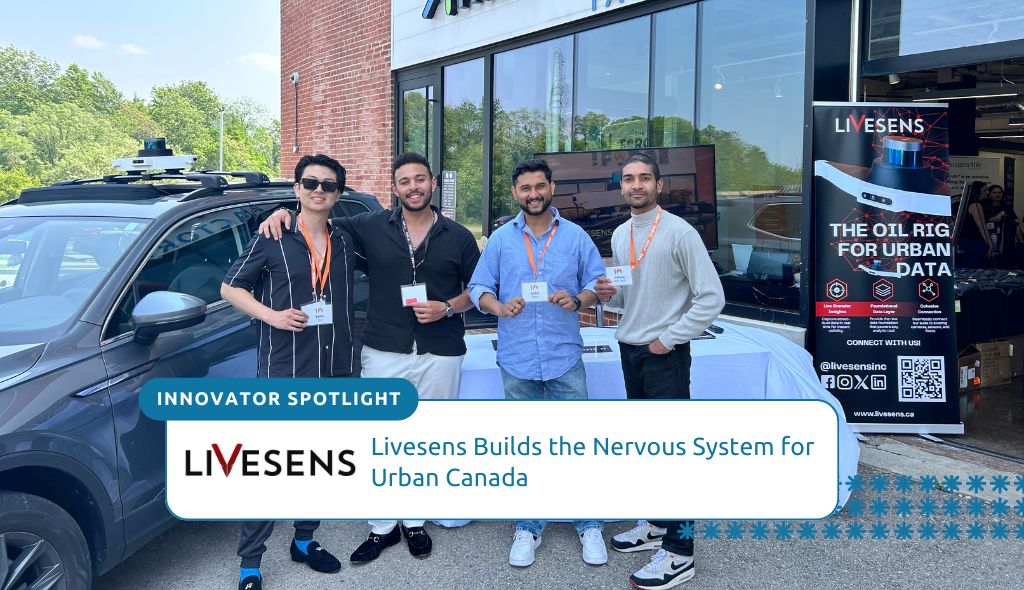Home » Livesens Develops the Urban Nervous System for Canada
Livesens Develops the Urban Nervous System for Canada

Summary of LiveSens: Transforming Urban Mobility through Data
Burlington’s startup LiveSens, founded by three engineering students from McMaster University, is pioneering a new approach to smart city technology by transforming vehicles into data-gathering hubs. Unlike traditional methods that rely on outdated traffic models, LiveSens employs modular sensor suites mounted on fleet and transit vehicles to capture real-time data on environmental factors, traffic patterns, and foot traffic. This innovative technology aims to help urban planners and decision-makers optimize city operations and services.
The idea originated from a simple observation on the highway—passing a digital billboard and questioning its visibility metrics. The founders recognized a significant gap in how real-world data was sourced compared to online metrics. Initial efforts focused on creating visibility tools for mobile advertisements, but as investment insights suggested a more substantial opportunity, the company pivoted to provide a broader platform aimed at enhancing the functionality of urban spaces. The mobility of vehicles equipped with sensors enables a dynamic collection of data, allowing cities to "see themselves live".
The unique technology behind LiveSens stands out in several ways. Their smart edge units, fitted to existing vehicles, process urban data while on the move, likening them to “roaming satellites for the street.” This mobility allows for hyper-local and frequent data capture, making it affordable and efficient—as opposed to fixed infrastructure or drones. The backend system aggregates multi-sensor data, filtering out unnecessary noise and delivering real-time insights to city dashboards and APIs. This immediacy allows city officials to act on data as it accumulates, eliminating the delays commonly associated with traditional reporting.
Addressing concerns over data privacy, especially in public environments, is central to LiveSens's operational ethos. The platform emphasizes achieving visibility without infringing on personal privacy. No facial recognition or biometrics are involved; instead, on-device algorithms anonymize data like faces and license plates before it reaches the cloud. Collaborations with academic ethics boards and municipal legal teams further ensure compliance and ethical governance.
LiveSens has initiated various real-world projects, illustrating its impact on urban infrastructure. The City of Hamilton is utilizing the service for monitoring issues like potholes and street lighting failures, while cities like Vaughan and Markham focus on early detection for maintenance of signage and pavement. McMaster University is also collaborating with LiveSens to create a live digital representation of its campus, aimed at risk prevention and maintenance.
The contributions of LiveSens place Canada in a promising position within the global Internet of Things (IoT) and smart city technology landscape. The startup emphasizes the importance of connecting local talent and resources to foster innovation in urban technologies. Their success communicates a message to fellow university-based startups: focus on solving real problems, embrace imperfect conditions, and demonstrate your ideas concretely to attract interest and funding.
In summary, LiveSens not only aims to make urban systems smarter but also prioritizes ethical considerations in data collection, promising to redefine how cities interact with and utilize real-time information. Their approach symbolizes a shift towards data-driven urban planning that is both effective and respectful of individual privacy rights.
Innovation Factory
Innovation Factory is a business accelerator, dedicated to helping Ontario-based businesses launch, scale, and succeed. Supporting the Brant, Halton, Hamilton and Norfolk regions, we provide start-ups, and scaling companies with advisory services, training, mentorship, and strategic connections to help bring disruptive technologies to market, leverage intellectual property, increase revenues, attract investment and create jobs. Innovation can happen anywhere, our goal is to make it work everywhere. We work to elevate key industry sectors including advanced manufacturing, clean tech, information technology, smart transportation, life sciences & health care and social innovations. We are passionate about driving the growth of Ontario businesses like yours. Whether you are an entrepreneur bringing new ideas to market or a scaling business trying to get to the next level, we want to help.

